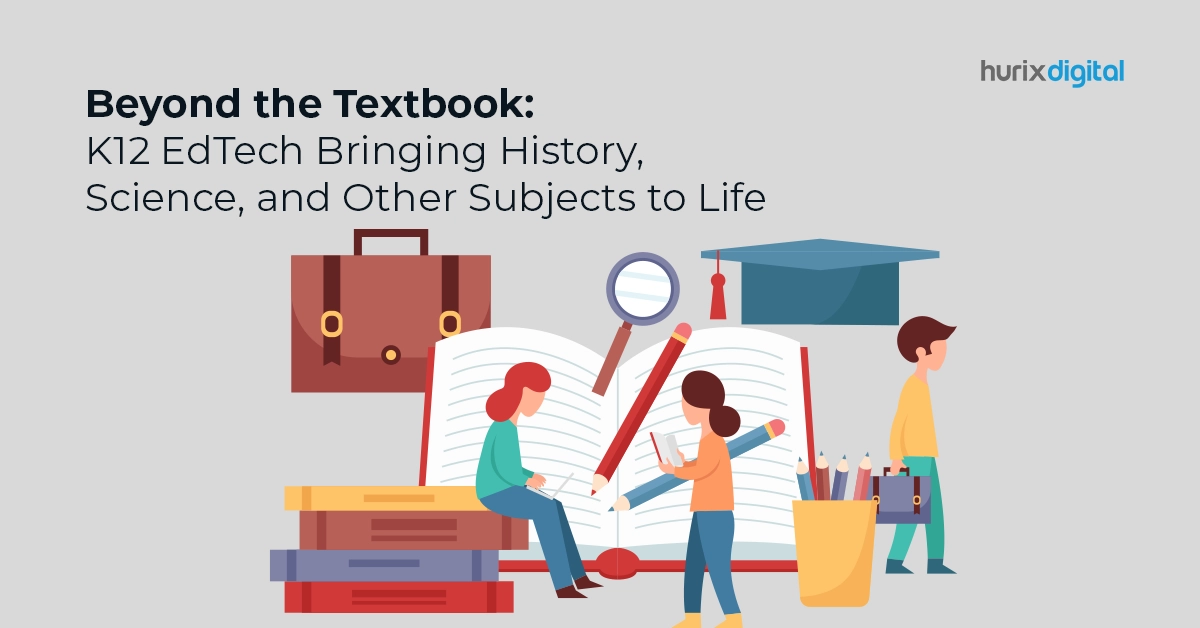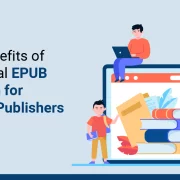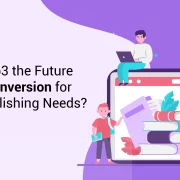
Beyond the Textbook: K12 EdTech Bringing History, Science, and Other Subjects to Life
Summary
Discover how K12 EdTech is making history, science, and other subjects come alive. Explore the impact of technology on engaging and enriching K12 education.
K12 education in the United States spans from kindergarten to grade 12 over various school levels in public and private schools. The introduction of K12 EdTech is an exciting and innovative development that engages teachers and students more interactively and attractively.
Artificial intelligence (AI) in K12 EdTech has facilitated a paradigm shift from traditional tools to the classroom in the form of smart classrooms, modern gadgets, and cloud technology. All of this provides a cohesive and powerful thrust to the educational process.
Emerging technologies have been incorporated into diverse K12 EdTech environments, focusing notably on artificial intelligence (AI), machine learning (ML), the Internet of Things (IoT), augmented reality (AR), and virtual reality (VR). While these technologies swiftly become a part of children’s daily experiences, their intricate and widespread nature often leads to a limited comprehension of their functionalities and implications.
Here, we take a closer look at how educational technology (EdTech) is revolutionizing the K12 education system, making it more holistic than the traditional textbook learning system.
Table of Contents:
- EdTech in the K12 Education System
- Challenges and Considerations in the K12 Education System
- In Conclusion
EdTech in the K12 Education System
In the ever-evolving landscape of education, technology has become a catalyst for transformation, especially in K12 settings. EdTech has proven to be a powerful tool in bringing subjects like history and science to life.
Here are some of the ways K12 EdTech is revolutionizing the way students engage with and comprehend complex subjects, making learning more engaging and effective:
1. Interactive Digital Learning Platforms
One of the primary ways EdTech is reshaping K12 education is through interactive digital learning platforms. These platforms go beyond traditional textbooks, offering students dynamic and engaging content that caters to various learning styles.
Interactive lessons, simulations, and multimedia resources enable students to actively participate in their learning, fostering a deeper understanding of historical events, scientific principles, and other subjects.
For instance, history lessons are no longer confined to static timelines and textbooks. EdTech in social studies includes virtual tours of historical sites, allowing students to explore ancient civilizations, witness pivotal moments, and gain a firsthand understanding of historical contexts. These immersive educational experiences make history more tangible and memorable, transforming it from the distant past into a living narrative.
Similarly, in the realm of science, science education innovations like virtual laboratories and simulations have become integral components of K12 EdTech. Students can conduct experiments, manipulate variables, and observe outcomes in a risk-free virtual environment.
This not only enhances their understanding of scientific concepts but also instills a sense of curiosity and experimentation that goes beyond textbook learning.
2. Augmented Reality (AR) and Virtual Reality (VR)
EdTech takes a giant leap forward with the incorporation of Augmented Reality (AR) and Virtual Reality (VR) technologies like interactive video content. These immersive technologies provide students with experiences that were once unimaginable within the confines of a classroom.
In history classes, AR and VR can transport students to pivotal moments in time. They can walk through ancient civilizations, witness historical events unfold, and interact with virtual historical figures. This experiential learning helps students forge a personal connection with the past, fostering a sense of empathy and a deeper appreciation for historical nuances.
In the field of science, AR and VR create opportunities for students to explore the microscopic world, travel through space, or dive into ecosystems. By visualizing abstract concepts, students can grasp complex scientific theories and principles more intuitively. These technologies make learning science an adventure, inspiring students to pursue further exploration and inquiry.
Also Read: Ethical Considerations of AI in K12 Education: Navigating the Future of Learning
3. Real-world Applications
K12 EdTech goes beyond theoretical knowledge by integrating real-world applications into the curriculum. This approach bridges the gap between classroom learning and practical implementation, preparing students for the challenges they may face in the future.
For instance, in history classes, students can engage in historical research projects using digital archives and databases. They can analyze primary sources, develop critical thinking skills, and construct historical narratives. This not only deepens their understanding of historical events but also equips them with valuable research and analytical skills applicable to various academic and professional pursuits.
In science education, real-world applications of EdTech include connecting theoretical concepts to technological advancements. Students can explore how scientific principles contribute to innovations in fields such as medicine, engineering, and environmental science. This interdisciplinary approach fosters a holistic understanding of science and encourages students to envision themselves as contributors to future advancements.
4. Adaptive Learning Platforms
EdTech also addresses the diverse learning needs of students through adaptive learning platforms. These platforms adopt multisensory learning tools to use data analytics and artificial intelligence to personalize learning experiences, catering to individual strengths and weaknesses.
In history classes, adaptive learning platforms can tailor content based on a student’s historical interests, providing a customized learning path. Students can delve deeper into specific periods or regions, fostering a passion for history that extends beyond the curriculum. This personalized approach ensures that students receive the support and challenges they need to excel in their historical studies.
In science education, adaptive digital learning platforms can identify a student’s proficiency in various scientific concepts and adjust the difficulty level accordingly. This prevents students from feeling overwhelmed by complex topics or bored by material they’ve already mastered. By adapting to individual learning styles, EdTech promotes a more inclusive and effective learning environment.
5. Collaborative Learning Environments
EdTech facilitates collaborative learning environments, breaking down the barriers of traditional classrooms. Students can connect with peers, educators, and experts from around the world, fostering a global perspective on historical events and scientific discoveries.
In history classes, collaborative digital learning platforms enable students to engage in virtual debates, research projects, and cultural exchanges with students from different regions. This intercultural dialogue enriches their understanding of historical events by incorporating diverse perspectives and experiences.
In science education, collaborative platforms facilitate joint experiments, data analysis, and discussions among students. Virtual collaborations with scientists and researchers provide students with insights into real-world scientific practices and challenges. This collaborative approach not only enhances scientific knowledge but also nurtures essential skills such as teamwork, communication, and problem-solving.
Challenges and Considerations in the K12 Education System
While K12 EdTech brings significant benefits to history, science, and other subjects, it is crucial to address the challenges and considerations associated with its implementation.
1. Limited Access to Technology
Limited access to technology remains a concern, particularly in underserved communities. For example, according to a report by UNESCO, endorsement and implementation of AI curricula in schools are limited to only 11 governments across the globe.
2. Digital Divide
The digital divide may exacerbate educational inequalities, limiting some students’ opportunities to benefit from the advantages of EdTech. Initiatives focused on bridging this gap and ensuring equitable access to technology are essential for the widespread success of K12 EdTech.
3. Adaptability Issues
Additionally, educators may face challenges in adapting to and effectively integrating new technologies into their teaching methods. Professional development opportunities and ongoing support are essential to empower educators to leverage EdTech tools effectively and maximize their impact on student learning.
4. Ethical Aspects
Furthermore, the ethical use of technology in education must be a priority. Data privacy, online safety, and responsible use of emerging technologies require careful consideration to ensure a secure and positive learning environment for students.
Also Read: EdTech Apps: Powering K12 Play-Learning
In Conclusion
K12 EdTech is transforming education by bringing history, science, and other subjects to life in ways previously unimagined.
Interactive digital learning platforms, augmented and virtual reality, real-world applications, adaptive learning, and collaborative environments are reshaping the educational landscape, providing immersive educational experiences, and making learning more engaging, personalized, and relevant.
As we continue to navigate the integration of technology into K12 education, addressing challenges, ensuring equitable access, and prioritizing ethical considerations are essential. Collaborating with digital EdTech specialists like Hurix Digital provides balanced access to digital eLearning and training solutions, access to all the relevant digital platforms and cloud services, and a host of K12 content and teaching solutions.
With a thoughtful and inclusive approach, K12 EdTech has the potential to inspire a new generation of learners who are not only well-versed in the subjects they study but also equipped with the critical thinking, collaboration, and adaptability skills needed for success in the ever-evolving world.
So what are you waiting for? Contact us today!

Senior Vice President
A Business Development professional with >20 years of experience with strong capability to sell new solutions and develop new markets from scratch. New Market Entry Specialist with experience of working in two of the largest emerging markets – China & India. Also covered other key markets in APAC, US, EU & ME. Exceptional experience of conceptualizing, ideating and selling new learning technologies like VR AR, etc. across multiple industry verticals.





